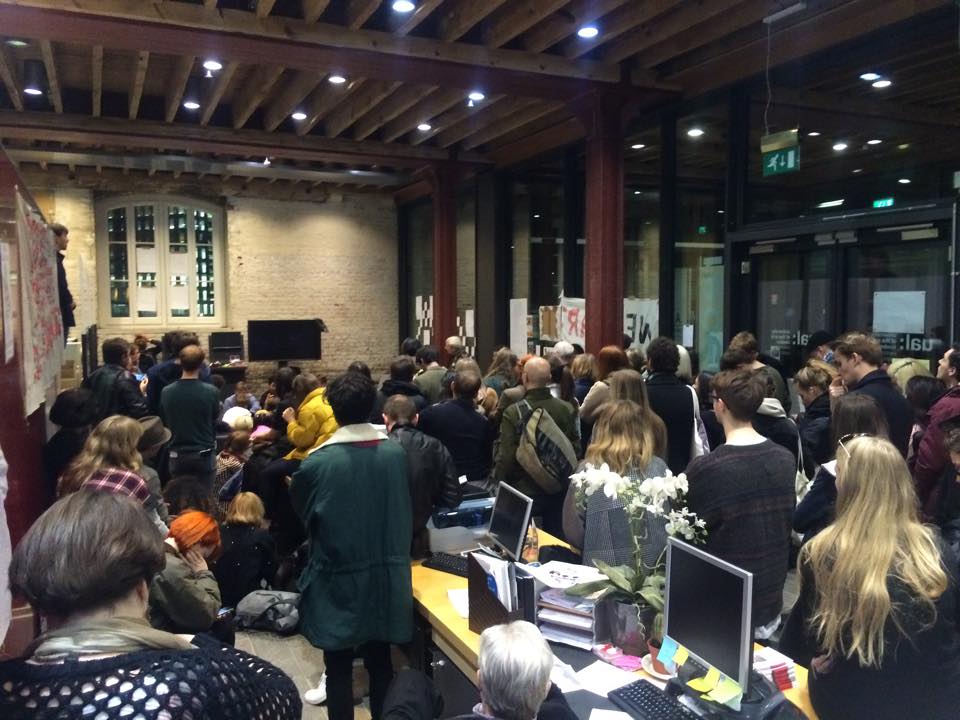3 Reasons the UAL Occupation Matters to FE, HE and the Free Education Movement
by Tom Scrivener
25 March 2015

Since 19 March, students and supporters have been occupying the ground floor of the main administrative building at Central Saint Martins – one of the six colleges of University of the Arts London (UAL). It is one of a number of occupations which have sprung into being with a set of demands anchored around the idea of free education.
In comparison to its near-neighbour occupation at the London School of Economics (LSE), where students have now been occupying a room for over a week, UAL has attracted less press attention and fewer visits from celebrities. But its demands are in many ways far more pressing: UAL’s occupation is an attempt to force management to negotiate over a series of swingeing course cuts.
Today, the LSE and UAL occupations are joining together for what should be a sizeable demonstration. So here are three reasons why what’s happening at UAL matters for further and higher education and the free education movement:
1. These cuts will shut people out of education.
The cuts proposed by UAL management will remove 580 places on foundation courses, sacking 23 teaching staff. Foundation courses are free-of-charge further education courses, and they basically have two functions. The first is to allow artists to explore different fields without immediately being boxed into one of them. The second is that they allow people without formal qualifications to access arts degrees. Most UAL students go through a foundation degree.
If the cuts go ahead, foundation courses will still be offered by colleges across the country, accredited by UAL. This is a money-maker for the university: it gets income for the accreditation and income from tuition fees when students arrive to do their undergrad. What is effectively happening is that UAL is separating out its higher education and further education course offerings – pushing FE students out from its own prestigious walls.
2. Cutting foundation is part of a wider restructuring of HE.
What is happening is in part a result of government cuts to further education, and these cuts are in line with a more generalised set of priorities for this government. Broadly speaking, state funding has been sucked away from areas like FE and the higher education teaching grant, and directed towards more prestigious, research-intensive activities. This is creating a two-tier education system. It also means that universities are exploiting students and making as much money as they can in fees income.
But the way in which this restructuring is taking place is also symptomatic of how a new breed of university manager is behaving. The heads of UAL, like those of most universities, regard themselves less as academics than as executives of large businesses. This is reflected in their contempt for staff: managers are ramming the cuts through in 30 days, with no more than token consultation with unions.
Rather than make any protest at large-scale cuts to FE funding, UAL management have chosen to meet the shortfall by enthusiastically appealing to lucrative markets. In place of the old foundation system, it proposes to introduce a new foundation course with a far higher number of international students, who will pay sky-high fees.
3. The new free education movement needs real struggle – not introspection.
The occupations at UAL, LSE and hopefully elsewhere are not isolated occurrences. Since November’s national demo for free education, the student movement has developed a new generation and learned to fight under the banner of something positive: free education. This move towards a positive demand has been a key missing element of the British student movement for well over a decade.
The problem with campaigning for free, liberated public education is that it is such a large-scale demand – whose democratising and transformative aspects are so ambitious as to be impossible to directly define – that it lacks a meaningful call to action. Because of this, free education runs the risk of developing an introspective political outlook, its adherents concerned far more with a set of prefigurative politics – creating our own ‘spaces’ which can embody and nurture anti-neoliberal values – than with taking on the university bosses or winning immediate demands.
This prefigurative politics has a necessary but limited role to play. Reclaiming space on campus by occupying it is usually a reliable way to pose a question over ‘who runs campus’, providing that management try to evict you. But at its extreme, it means little more than running a glorified events calendar, and walling yourself off from most people.
So what is happening at UAL is an example of how this emerging movement can bridge the gap between ultimate goals and immediate needs: through struggle. In order to have any hope of gaining traction, free education must move beyond being something students argue for or try to create themselves, and become the ideological backbone of a movement that makes itself relevant by engaging in disputes and struggles.
–
This article was amended on 12 May 2015 at the request of UAL. Previously, the article incorrectly stated 800 foundation places are to be removed and that dozens of staff will be sacked.